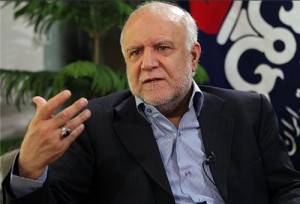 Iran plans to meet with international oil companies as soon as March to try to entice investors to itsenergy industry�once world powers lift sanctions, the Persian Gulf state�s oil minister said.
Iran plans to meet with international oil companies as soon as March to try to entice investors to itsenergy industry�once world powers lift sanctions, the Persian Gulf state�s oil minister said.Iran, once OPEC�s second-largest producer, is talking with European companies about future projects, Bijan Namdar Zanganeh told reporters today in Vienna. The minister said he hopes�Exxon Mobil Corp. (XOM), Royal Dutch�Shell (RDSA)�Plc,�BP (BP/)�Plc, Eni SpA and�Statoil ASA (STL)�will invest in the country. Iranian officials will meet with international companies in�London�in March, he said, declining to identify them.
The Islamic republic agreed last month to restrict work on its nuclear program for six months in return for a loosening of sanctions that offers about $7 billion in relief and access to $4.2 billion in oil revenue frozen in foreign banks. The accord leaves in place banking and financial measures that hampered crude exports. Zanganeh said he hopes the initial deal will lead to an agreement unfettering all sales of Iranian crude.
�We want to return to the market,� he said. �It�s our main priority,� Zanganeh said in the Austrian capital, where he attended a meeting of the Organization of Petroleum Exporting Countries. The group agreed to keep its crude output target unchanged at 30 million barrels a day.
OPEC�s �Wisdom�
Iran�wants to produce 4 million barrels a day of crude after international sanctions are lifted, �even if it goes down to $20 per barrel,� Zanganeh said. �Under no circumstances will I renege from Iran�s right to produce 4 million barrels a day, and I am sure OPEC will exercise wisdom in this matter.�
The country hasn�t approached any U.S. oil companies, though it has spoken with and plans to meet some businesses that are based in�Europe, Zanganeh said. �I�m not sure they would like me to mention their names,� he said in an interview posted today on the Oil Ministry�s news website Shana.
Iran pumped 2.65 million barrels of crude a day in November and hasn�t produced 4 million since August 2008, according to data compiled by Bloomberg. It�s exporting about 1 million barrels a day and may ship about 1.1 million barrels of crude and 300,000 barrels of condensate daily in the next Iranian year starting in March,�Shana reported�yesterday. Figures in the government budget are based on prices at $100, Shana reported.
Spurning Quotas
�I will not follow any limitation for returning to the market, to the previous level of production that we had,� Zanganeh said, addressing the question of whether OPEC should assign an output quota to Iran when it starts to produce more crude. �At least we will return to 4 million barrels a day.�
The Iranian minister is �in a tough spot,� said Jamie Webster, an analyst at IHS-PFC Energy, speaking in Vienna. �He has to say that for a negotiating position within OPEC. You start there, and then you back off to what you�re actually going to do. If this guy is willing to go to $20, there�s a real concern with U.S. production,� Webster said, referring to the surging output of shale oil in the U.S.
Brent crude, a benchmark for more than half of the world�s oil, has settled above $100 a barrel for every day but five this year and was at $112.19 at 3:57 p.m. in London.
Market Response
Iran�s negotiations with the U.S. won�t affect oil markets for another six months, OPEC Secretary-General Abdalla El-Badri told a news conference today at the group�s Vienna headquarters. By then the world will know whether the interim Iranian nuclear accord leads to a comprehensive agreement that enables the nation to boost its crude production, he said.
For now, laws forbid U.S. and European companies from striking energy deals with Iran, and other nations risk being excluded from the U.S. banking system if they violate sanctions. U.S. officials have said that Iran will not be allowed to increase crude exports unless it accepts a verifiable agreement over its nuclear program. Iran says its atomic research is for civilian use only.
Several companies including Shell, BP and Total had partnerships in Iranian energy projects in former years.
Shell complies with all applicable international sanctions against Iran, Sarah Bradley, a London-based spokeswoman for the company, said in an e-mail yesterday. Shell stopped upstream commercial activities in Iran in 2010 and halted trading with the country last year, she said.
�Huge Resources�
�As this is likely to be a very complicated political process, we need to take our time and watch the situation carefully,��Toby Odone, a London-based spokesman for BP, said in an e-mailed statement yesterday. �Iran clearly has huge resources� and �a lot of potential,� he said.
The Gulf nation, which is reviewing its oil developments contracts, won�t offer production-sharing agreements for future work, Zanganeh said.
Iran�s government is working to draft new oil development contract terms that may let international partners book reserves in the country in an attempt to attract longer-term partners, according to Mehdi Hosseini, an adviser to Zanganeh. The contracts will bring Iran closer to international norms, Hosseini said in an interview Nov. 6.
The country�s existing buy-back contracts require companies to pay for exploration and recover their investments from production at a pre-arranged rate of return. The ability to book reserves allows international�oil companies�to show they can replace crude already pumped with new barrels.
Iran�s oil reserves of 157 billion barrels are the world�s fourth-largest, and it holds the biggest gas reserves, estimated at 1,187 trillion cubic feet, according to BP�s Statistical Review. The nation has dropped to sixth place from second in OPEC, data compiled by Bloomberg show.
By Bloomberg
The Iran Project is not responsible for the content of quoted articles.










